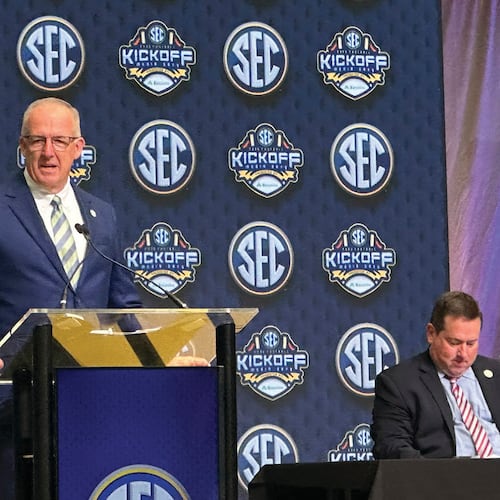“Unfinished business.”
That’s the mantra of the 2020 Georgia baseball team. It’s not exactly original, but it darn sure is applicable.
Playing its way to a national seed each of the past two seasons, the Bulldogs nonetheless failed to advance out of their own regional both times. Last year, No. 4 Georgia lost to Florida State, and it was to Duke the year before.
Heading into this season, their seventh under coach Scott Stricklin, all signs point to the “Diamond Dogs” being in that position again. They’re a consensus top-10 team, drawing preseason rankings as high as No. 4 and no lower than 11th from the plethora of college baseball polls.
So, everybody is expecting big things from Georgia again this season. The key is finishing stronger this time around.
It’s not exactly “Omaha or bust,” but it certainly can’t be “Athens and crash” again.
Hence, “unfinished business.”
“That started from Cam Shepherd,” Stricklin said before a recent intrasquad game at Foley Field. “He’s the one that said that. Somebody asked him why he decided to come back, and he said, ‘We have unfinished business here, and I want to come back and finish it.’”
Shepherd’s one of the big reasons why the Bulldogs could indeed make it to Omaha. Shepherd is one of 12 experienced upperclassmen who return to give it another go for UGA. Like several in that crowd, Shepherd could have made the jump to the professional ranks. Eight Bulldogs were drafted off last year's team.
“Growing up, we all have dreams of trying to get to the College World Series in Omaha,” said Shepherd, who earned the Gold Glove as the nation’s top shortstop in 2019. “That was the big drive for me coming back. That was the main reason. I’ve always had the dream since I was a little kid, and a lot of guys on our team have the same exact dream. So, the decision to come back was to have one more shot, and I think that’s huge.”
Stricklin thinks so, too.
“When you have a lot of older players, which we do, it’s kind of rare the way we lose our juniors,” he said. “So, to have experienced players that have been contributing over two good seasons, that helps you get better, for sure.”
It starts with pitching. Junior right-hander Emerson Hancock is a consensus preseason All-American selection. Along with sophomore power pitcher Cole Wilcox and left-handers C.J. Smith and Ryan Webb, they combine to give the Bulldogs one of the best starting staffs in college baseball. Behind them is the bulk of a defensive lineup that posted a school record .980 fielding percentage last year.
Replacing the power and clutch-hitting of All-American third baseman Aaron Schunk in the batting order is the only box unchecked for the Bulldogs heading into the season, which begins Friday at Foley Field for the first of a three-game set against Richmond. Georgia believes it has answers for that as well.
Stricklin said the Bulldogs will run more this season and try to put more pressure on defenses on the base paths. They’re built for it, with speedy junior Riley King returning despite being drafted in the 26th round by the Braves. Shepherd can also run, and Georgia will add more speed to the base paths with Furman transfer Ben Anderson and freshman signee Buddy Floyd.
“When you play a lot of close games like we do in the SEC, you’ve got to find a way to win 4-3 instead of losing 3-2,” Stricklin said. “You’ve got to find a way to score that extra run. So, you might see a little more hit-and-run, maybe a little more aggressiveness on the base paths. We’re not going to be a team that hits 100 home runs, but I think we’re going to be a team that has some sneaky pop.”
Power-hitting might be the Bulldogs’ biggest deficiency. Georgia will be missing 44 home runs and 185 RBIs with the loss of Schunk, LJ Talley, John Cable and Tucker Maxwell. But Shepherd and King each hit eight home runs each last season, and they’ll each be seeking to double that production, at least.
The Bulldogs also expect to get a boost from Garrett Blaylock, a Vanderbilt transfer by way of junior college, who will step in at Schunk’s third-base position. Third-year sophomore Connor Tate, who will take over Cable’s designated-hitter role, has displayed a powerful bat in fall and preseason workouts.
Regardless of how that plays out, the Bulldogs know they can bank on their pitching. Hancock, a 6-4 junior, is in the conversation to become the first player selected in June’s MLB draft. He was 8-3 last season with a 1.99 ERA and 97 strikeouts in 14 starts, and only an injured finger late in the season kept him from being even more dominating.
Georgia can turn next to Wilcox, a 6-6 sophomore who broke the 100-mph barrier a few times last season. He, too, is draft-eligible. The left-hander Smith, who also can play in the field, is back after he was sidelined with an injury late last season. Along with fellow lefties Webb and Justin Glover and senior right-handers Will Proctor and Logan Moody, the Bulldogs have a lot they can throw at the competition.
All those upperclassmen endured those unceremonious exits each of the past two postseasons. They’re bent on this one being different.
“We’re using last year as motivation, but at the same time, we’ve got to move on and forget,” said Shepherd, who was a 20th-round selection of the Tampa Bay Rays. “You can’t dwell on what’s happened in the past. It’s a new year and it’s a new team, and I think we have a really good shot at getting over that hump, finally.”
Georgia hasn’t made it to Omaha since 2008. Now’s as good a time as any.
About the Author
Keep Reading
The Latest
Featured


